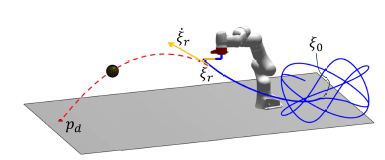Giorgio Simonini, Marco Baracca, Tommaso Cavaliere, Antonio Bicchi and Paolo Salaris
IEEE Access

Abstract
Computed Torque Control is a widely used control strategy for ensuring precise trajectory tracking and impedance behavior in robotic manipulators. However, because it relies on feedback linearization using the robot’s dynamic model, any inaccuracies in the model can adversely affect tracking performance. This effect is even more visible when low feedback gains are used to impose compliance in the robot’s behavior. Adaptive Computed Torque Control addresses this issue by updating the dynamic model parameters to achieve asymptotic stability. Nevertheless, the classical update law requires the inversion of the estimated mass matrix, potentially leading to numerical stability problems. Several approaches, such as Adaptive Inertia-Related Control, were proposed to overcome this problem. However, they have problems in guaranteeing the desired impedance behaviour. In this work, we present a novel adaptive computed torque control law formulated both in joint space and Cartesian space, and we provide theoretical proofs of its asymptotic stability. We validate the proposed controller through simulations and real-robot experiments involving various dynamic motions. Finally, we demonstrate its effectiveness in a real dynamic task: throwing an unknown object.
@ARTICLE{10967496,
author={Simonini, Giorgio and Baracca, Marco and Cavaliere, Tommaso V. and Bicchi, Antonio and Salaris, Paolo},
journal={IEEE Access},
title={A Novel Formulation for Adaptive Computed Torque Control Enabling Low Feedback Gains in Highly Dynamical Tasks},
year={2025},
volume={13},
number={},
pages={69898-69909},
keywords={Torque control;Robots;Computational modeling;Mathematical models;Manipulator dynamics;Adaptation models;Friction;Torque;Asymptotic stability;Aerospace electronics;Adaptive control;parameter estimation;collaborative robots;throwing of objects},
doi={10.1109/ACCESS.2025.3561635}}

